ScanlineFilling.h
#include <iostream>
#include <vector>
class ScanlineFilling
{
public:
class Edge {
public:
int x1, y1, x2, y2, dx, dy;
Edge(int x1, int y1, int x2, int y2);
};
private:
std::vector<Edge> edgeTable;
int getYmin();
int getYmax();
bool isActive(Edge edge, int currentY);
void updateActiveEdges(std::vector<Edge>& activeEdges, int y);
void findIntersections(std::vector<int>& intersections, std::vector <Edge> activeEdges, int currentY);
public:
// 多边形填充
// 参数:matrix: 要填充的二维数组,
// x,y: 数组的行列,
// position: 多边形的坐标[x,y],
// len: 多边形坐标的个数(从起点到终点的个数,其中起点==终点),
// fillValue: 填充的值
void fill(int** matrix, int x, int y, int** position, int len, int fillValue);
};
ScanlineFilling.cpp
#include "ScanlineFilling.h"
#include <iostream>
#include <vector>
#include <algorithm>
using namespace std;
ScanlineFilling::Edge::Edge(int x1, int y1, int x2, int y2) {
this->x1 = x1;
this->y1 = y1;
this->x2 = x2;
this->y2 = y2;
this->dx = x2 - x1;
this->dy = y2 - y1;
}
int ScanlineFilling::getYmin() {
int yMin = edgeTable.front().y1;
for (Edge edge : edgeTable) {
if (edge.y1 < yMin)
yMin = edge.y1;
}
return yMin;
}
int ScanlineFilling::getYmax() {
int yMax = edgeTable.front().y1;
for (Edge edge : edgeTable) {
if (edge.y1 > yMax)
yMax = edge.y1;
}
return yMax;
}
bool ScanlineFilling::isActive(Edge edge, int currentY) {
return edge.y1 < currentY && currentY <= edge.y2 || edge.y1 >= currentY && currentY > edge.y2;
}
void ScanlineFilling::updateActiveEdges(std::vector<Edge>& activeEdges, int y) {
for (Edge edge : edgeTable) {
if (isActive(edge, y)) {
activeEdges.push_back(edge);
}
}
}
void ScanlineFilling::findIntersections(std::vector<int>& intersections, std::vector<Edge> activeEdges, int currentY) {
for (Edge edge : activeEdges) {
int x = edge.x1 + ((currentY - edge.y1) * (edge.dx)) / (edge.dy);
intersections.push_back(x);
}
}
// 多边形填充
// 参数:matrix: 要填充的二维数组,
// x,y: 数组的行列,
// position: 多边形的坐标[x,y],
// len: 多边形坐标的个数(从起点到终点的个数,其中起点==终点),
// fillValue: 填充的值
void ScanlineFilling::fill(int** matrix, int x, int y, int** position, int len,int fillValue) {
vector<Edge> activeEdges;
vector<int> intersections;
int firstX, firstY;
edgeTable.clear();
// 获取要填充的多边形的边
for (int i = 0; i < len; i++) {
if (i == 0) {
firstX = position[i][0];
firstY = position[i][1];
continue;
}
edgeTable.push_back(*(new Edge(firstX, firstY, position[i][0], position[i][1])));
firstX = position[i][0];
firstY = position[i][1];
}
int yMin = getYmin();
int yMax = getYmax();
for (int y = yMin; y < yMax; y++) {
activeEdges.clear();
intersections.clear();
updateActiveEdges(activeEdges, y);
findIntersections(intersections, activeEdges, y);
// 升序
sort(intersections.begin(),intersections.end());
for (int i = 0; i < intersections.size(); i += 2) {
int x1 = intersections[i];
if ((i + 1) >= intersections.size()) {
break;
}
int x2 = intersections[i + 1];
for (int k = x1; k < x2; k++) {
matrix[k][y] = fillValue;
}
}
}
}
二维矩阵填充测试:
int main() {
int** matrix = new int* [10];
for (int i = 0; i < 10; i++) {
matrix[i] = new int[10];
for (int j = 0; j < 10; j++) {
matrix[i][j] = 0;
}
}
int** position = new int* [4];
position[0] = new int[2];
position[1] = new int[2];
position[2] = new int[2];
position[3] = new int[2];
// 起点
position[0][0] = 2;
position[0][1] = 2;
// 中间点
position[1][0] = 2;
position[1][1] = 8;
position[2][0] = 8;
position[2][1] = 7;
// 终点
position[3][0] = 2;
position[3][1] = 2;
ScanlineFilling* sc = new ScanlineFilling();
sc->fill(matrix, 10, 10, position, 4, 1);
// 打印填充结果
for (int i = 0; i < 10; i++) {
for (int j = 0; j < 10; j++) {
cout << matrix[i][j] << " ";
}
cout << endl;
}
return 0;
}
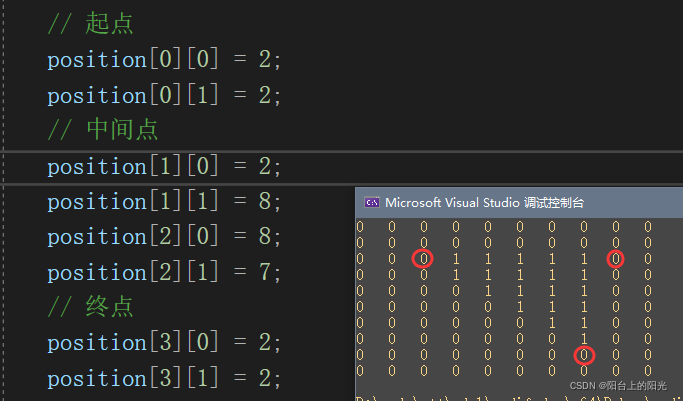
对 DEM 数据进行置平
ScanlineFilling* sc = new ScanlineFilling();
// greyValue: dem 高程值二维矩阵
// X,Y: dem 高程值二维矩阵在 x(lat),y(lon)方向上的像素个数
// position: 要填充的多边形的坐标(第一个点和最后一个点相同),
// 用 shp 文件置平,经纬度要转换为 dem 高程值的索引位置
// pointCount: 多边形坐标个数, position.length
// minGreyValue: 要填充的高程值
sc->fill(greyValue, X, Y, position, pointCount, minGreyValue);
填充结果:
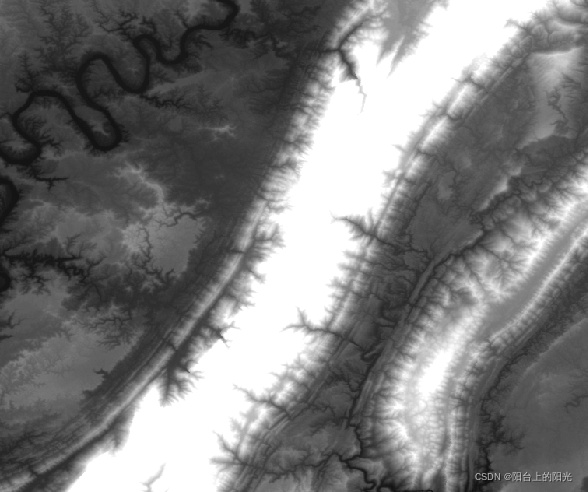
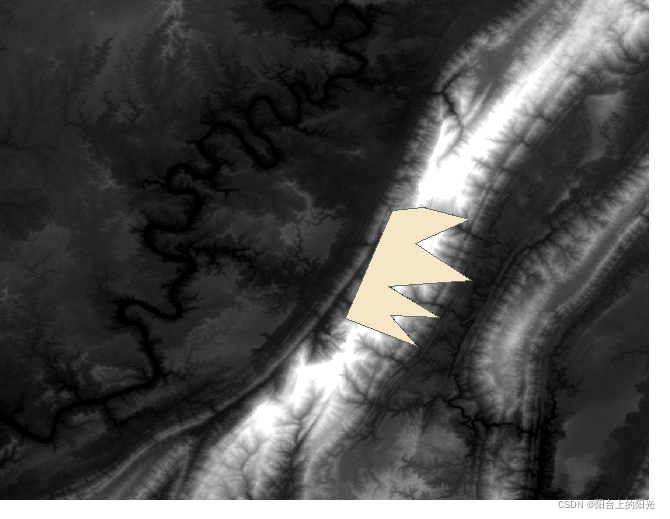
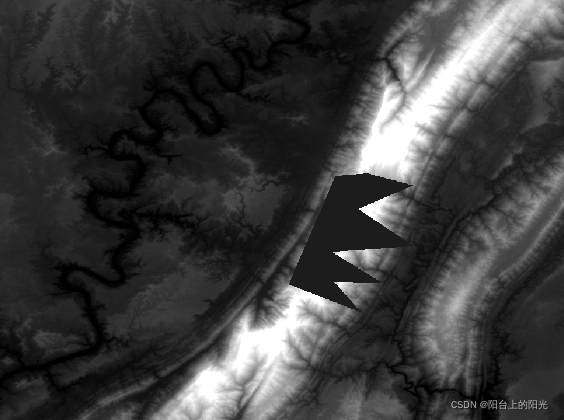
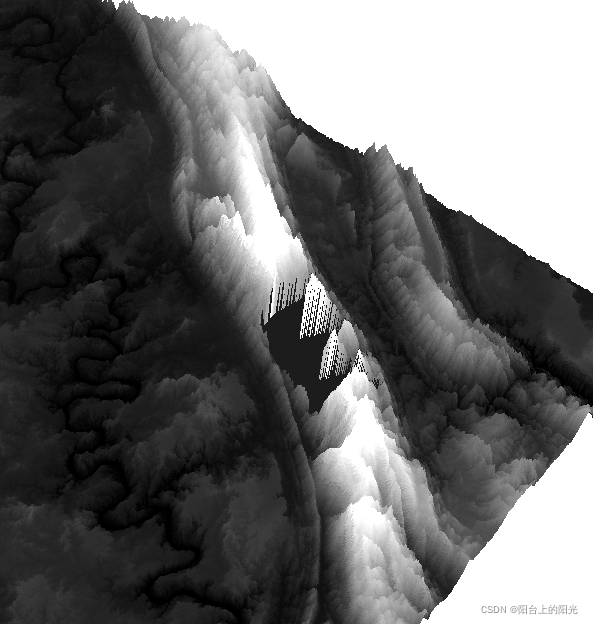






















 941
941











 被折叠的 条评论
为什么被折叠?
被折叠的 条评论
为什么被折叠?








